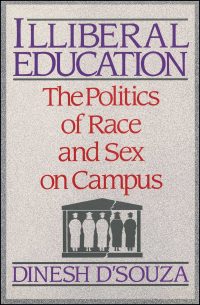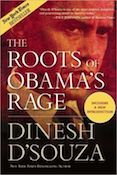Illiberal Education: The Politics of Race and Sex on Campus
This book—the most complete study we have had of the capture and degradation of higher education by the Left—received so much deserved attention prior to publication that its themes do not need much exposition. Excerpts appeared in periodicals as varied as the Atlantic, the American Scholar, and Forbes. Stories prompted by the book were published in all the newsweeklies. Its appearance caps a remarkable evolution of public opinion, in the now-widespread recognition that the universities have become engines of political indoctrination and control. This has, in fact, been true for about a quarter-century, but for various reasons, it has taken a long time to become evident, as is sometimes the case with malignancies. Whether this one can be treated, and at what cost to the patient, remains to be seen.
Illiberal Education opens with a chapter on what Dinesh D’Souza terms “the victim’s revolution.” Preferential policies in college admissions, for the presumed purpose of fostering ethnic diversity, have had the unwanted, although quite foreseeable, effects of disqualifying many able students—i.e., white males—on the grounds of race and sex, while admitting many students unable to keep up. Resentments build, and sooner or later explode in racial incidents, or at best are kept in check by de-facto self-segregation. In response, college administrations which long ago gave up the notion ofin loco parentis about anything and everything, suddenly find that it has its uses after all, in suppressing sardonic and other untoward forms of speech. They promptly set up kangaroo courts to do so. But negative reinforcement is not quite enough, so virtuous thinking is further induced by mandatory education about the merits of diversity. Yet even that is not quite enough, so the curriculum is trashed and rebuilt.
D’Souza illustrates these processes by discussing key incidents at leading universities: Berkeley, on preferential admissions, because the data are public, as they are not elsewhere, and because the ethnic variety of the state of California has produced baroque patterns of racial preference; Stanford, for its pioneering work in curriculum-trashing; Howard, for its ventures in Afrocentrism; Michigan, my own beloved university, for its bungling but persistent efforts to undo the First Amendment; Duke, for breaking new ground in moral and all other forms of relativism; and finally, Harvard, for showing us how to allow great scholars like Stephan Thernstrom to be insulted by uninformed students while deans look on approvingly.
Do you find my sarcasm heavy-handed? You are probably right—it is a defense against affect, as we say in my trade. This is a painful book to read for anyone with a strong sense of what the university ought to be. Other reviews have termed what it reveals “chilling,” “sickening,” “disturbing,” to which one can add, depressing, infuriating, appalling, disgusting, or any other adjective denoting intense negative emotion. Why is it so upsetting? Because of the sheer accumulation of detail, incident after incident, at institutions large and small, pedestrian and distinguished, each example depicting outrageous behavior—the arrogance and disingenuousness of the Left, the cravenness, confusion, and stupidity of administrators, the passivity and self-absorption of the faculty. As you read these accounts, there is a moment when you recognize, suddenly, that things are really much worse than you thought. And that recognition is followed by still another, that matters are even worse than that, since there are so many incidents no one knows about, because they are too local or too commonplace.
Some examples just from the last week or so: I learn of a history teacher who will not permit his students to use the term “Founding Fathers” because it is sexist. Students taking a course in “diversity” are told that minorities are intrinsically incapable of racism. A teacher in one of the health professions discovers that one of her students is marginally literate, cannot understand the textbook, and advises that she seek remedial help in reading; the student reports her to be racially biased, and she must meet with an associate dean before she is let off the hook.
Most troubling of all, I learn that the unexpected resignation of an old friend of mine a few years ago had been due to political pressures. She was the best teacher in her (professional) school and a scholar of national standing, yet was called to account by a faculty panel because of complaints by leftist students that she was not taking the proper line in her lectures. Her dean would not support her, and her colleagues hid out; so, being much in demand as a consultant and lecturer, she left the university. The incident itself is not unique, far from it. I report it only because she did not mention her reasons until now. Why? Because she wanted to get out as quickly as possible, too filled with contempt for her colleagues to bear their presence. Her resignation was more decisive than most. More common is an internal resignation, that inner exile we see in totalitarian states.
Even sympathetic outsiders may find it hard to accept the comparison. But consider the similarities. There is the din of relentless propaganda, the incessant advertising of politically correct events. My departmental bulletin board has about half of its space taken up with such notices and ads. There is a four-page newsletter from the Office of Affirmative Action, this one devoted to Native Americans, lamenting (tactfully) the absence of sufficient outrage; they are advised (delicately) to get with it and complain more. There is a large announcement describing all the courses in Women’s Studies for the next semester, most of them quite openly political. There is a four-page brochure announcing a “diversity resources program,” a sort of trade convention, where people will display and distribute their diversity materials. There is a notice inviting nominations for the Martin Luther King/Caesar Chavez/Rosa Parks lectureships, where munificent fees are awarded to minority speakers. There is a notice announcing a course which will teach all of the following: “Racism, Sexism, Homophobia, Homelessness, Domestic Violence, Environmental Destruction, Teenaged Runaways, the AIDS Crisis, Rape.” All in one semester, and for two credits. The course is addressed to anyone who cares about social problems and wants to make a difference. If you’ve never been involved in social change before, this is a great way to start. If you are already working on social change, this is a way to get credit for your activism.
And those are just the offerings. You will also find a wealth of cautionary notices, warnings against discrimination and where to report suspected instances, and, more recently, warnings about date rape. We have the makings of a growth industry here, since the administration is now cooking up a sexual harassment code, a piece of legal surrealism which some teachers feel will lead to the building of dossiers containing uncorroborated accusations against faculty, including charges of ideological transgressions. These teachers may be overreacting, but given the flagrant unconstitutionality of Michigan’s effort to constrain speech, no one takes anything for granted.
There are other parallels. Preferential policies bring in their wake the growth of silence and deception, designed to conceal troubling information about qualifications, costs, and outcomes. The Michigan faculty is refused any data about the test scores and grade-point averages of those admitted under affirmative action. Should you ask, the question will be evaded. Should you persist, you may be told rather coldly that it is none of your business. So much for the rights of the faculty, who on the whole acquiesce meekly, and perhaps even collusively, not really wanting to know. Many, in fact, believe the information should be kept secret, on the grounds of sensitivity and so on. What no one seems to know is what justifies keeping such data secret in a public university.
Controlling the news has the usual effects—a reliance on underground information, on rumor, gossip, innuendo, and hearsay, accuracy unknown. A professor in a neighboring department tells a woeful tale of the problems he has been having with students who, he says, never should have been admitted. A professor in the same department, in the same week, and referring to the very same students, tells a cheerful tale of obstacles overcome and pleasant surprises. Who is to be trusted? Perhaps one, perhaps the other, perhaps neither, perhaps both. I am fairly sure that the second professor, Dr. Candide, feels that good outcomes are all that matter, that the casualties of affirmative action—the majority students who are not admitted as well as the minority students who fail to make the grade—are well worth the cost. It is a not uncommon mode of justification, a peculiar form of Social Darwinism, in a way. Yet it is just as easy to imagine that both professors simply see what they want to see, and nothing else. Still, on the whole, one is more likely to trust the bearer of ill findings, since the good news makes its way immediately into a press release.
The historian Eugene D. Genovese, reviewing this book elsewhere, proposes that the terrorism on campus be met with counter-terrorism, by demonstrations and other forms of public indignation. I wish him well, earnestly, but with not much optimism. Where will he find his recruits? Some professors are impassioned believers in racial preference. I have had an English teacher—a white male, of course—berate me because my department was hiring too many white males. He keeps count. Most faculty in the social sciences and humanities are favorably disposed, and those who have misgivings have been quiet up until now. All they need do is compute the potential costs of dissent and compare them with the benefits of remaining silent.
In a short essay written over 200 years ago, Samuel Johnson likened scholars to beauty queens; each is the fairest of them all. That vanity persists. Many scholars are too self-absorbed to become engaged unless their interests are threatened directly. This is especially true in the scientific and technical fields: the sciences, engineering, medicine, dentistry, pharmacy, where the scholar’s self-esteem and even survival depend upon winning research grants, and where there is every incentive to avoid the politics—either internal or external—which might distract from that end. Though they have a strong belief in maintaining standards, and are little given to egalitarian passions, the scientists will not bother unless they see a clear danger to their own work. They do not have to worry much about under-qualified students or faculty appointments, not yet, since both grading and professional achievement are more easily objectified; and they do not have to cope with demands for courses on such topics as Gender and Astrophysics. Not yet.
A recent letter in the London Times Literary Supplement from a Marxist teacher of literature, writing on Roger Kimball’s Tenured Radicals, scoffs at the idea that American universities have been politicized. It is much ado about nothing, he tells us; otherwise, the legislators and trustees would step in and crack down. Quite clearly this man lives in a world of his own, but his letter does raise a question. Why has there been so little notice taken of campus events by governing boards and legislatures? Do they know what is going on? Does it please them, or trouble them? Do they feel they can do nothing, or ought to do nothing, or are they simply run by the university administrators?
There are, after all, radical professors who boast openly that their mission is to indoctrinate the children of influential families, and they are successful far more often than you might think. There really are English majors who believe Alice Walker is a Truly Great Novelist, surpassing Henry James, whoever he may be. D’Souza reports that two of the militants he spoke to at Michigan had never heard of John Stuart Mill. Leaving aside the miseducation of students, Michigan has emerged as a notorious example of political correctness, even as a laughingstock. Does our Board of Regents care? Or do they just hope it will go away by itself? If the universities are to be restored, they will need the help and encouragement of others. The faculties have neither the will nor the interest: après nous, le déluge.
D’souza has some very smart things to say about engaging the support of the alumni, parents, and other citizens. His wonderful book, arriving not a moment too soon, may even help turn the tide. Meanwhile, however, things continue to deteriorate. We learn from an article by Miro Todorovich, a longtime foe of the campus blight, about what has just taken place at the State University of New York at Bingham ton, where a dean has run amok intellectually and has proposed a Great Purge (yes, she uses the word “purge”) of faculty and departments not yet in tune with the new order of things, naming “English, Management, Sociology, Medieval and Renaissance Studies, Nursing, Cinema, History, Chemistry, and Biology.” The usual sins are responsible, but a new one is added, the presence of “logocentric modes of discourse,” meaning a belief in language and reason. It is a cant phrase borrowed from Derrida, a leading contributor to our contemporary confusion, and it is hard to know how and why it applies to the teaching of chemistry, and how you would fire someone on those grounds. (Do you say, “Professor Smith, you are charged with logocentric discourse about the Table of Elements”?) And if chemistry is so charged, why not physics? Both are products of that “Western Culture” which the dean wants to be rid of, since it achieved its hegemony through violence.
A few days after Todorovich’s report appears, the Wall Street Journal brings news of another event at the same university. A mob of 200 students, some carrying canes and sticks, invades a meeting of professors and curses and jeers and threatens them and roughs up an elderly professor. The thugs, the Journal tells us, were incited and led by faculty, presumably praetors of the dean’s new order. The university’s president dismisses the incident as being of no importance.
We are left with two questions: first, how in the world do people like the dean and the president attain high academic office? And second, will someone hold them to account, and if not, why not? While we await the answer, let us at least note how fitting it is that a deconstructionist dean, an apparent disciple of Derrida, the great defender of Paul de Man, the (secret) defender of the Nazis, should set in motion a new appearance of Storm Troopers.
Book Review from Commentary, by Joseph Adelson
Tags: Dinesh D'Souza, Illiberal Education: The Politics of Race and Sex on Campus
- The Author
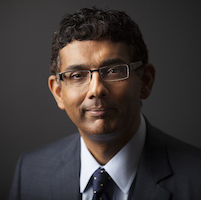
Dinesh D’Souza
** Exclusive CBC Author Interview with Dinesh D’Souza ** Bestselling author Dinesh D’Souza has had a major influence on American […] More about Dinesh D’Souza.
- Books by the Author
- Related Articles

The Top 10 Conservative Books of 2018
2018 has been another great year for conservative books, from meditations on conservative thought to more politically focused fare to […]
The 5 Best Conservative Summer Reads of 2018
Looking for one last conservative book to read before summer comes to a close? Take 5 - check out our[...]
Movie Review: Dinesh D’Souza’s “Death of a Nation”
Dinesh D'Souza is back with another bestselling book-and-movie tandem -- "Death of a Nation"! Read our review to see how[...]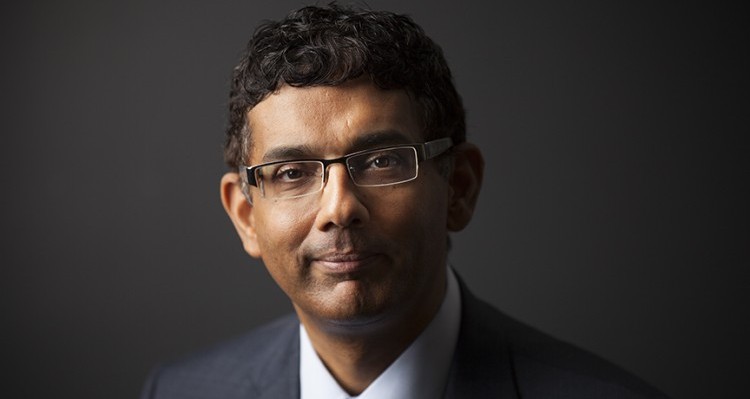
Dinesh D’Souza and Greg Gutfeld Headline Our Weekly Roundup
In this week's roundup, check out new books from Dinesh D'Souza and Greg Gutfeld, lists about both books, and best[...]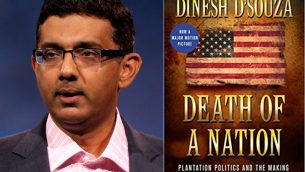
Episode #25 – Dinesh D’Souza Interview: A New Book, New Movie, and the Dark History of the Democratic Party
Learn the dark history of the Democrat Party in our exclusive interview with Dinesh D'Souza as he discusses his new[...]




